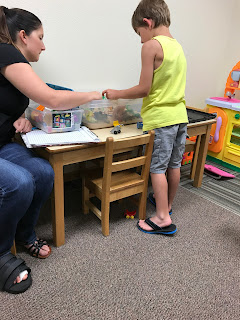PLAY PLAY PLAY!!!!
Play Therapy is a play-based technique which builds on ASD kids' own interests or obsessions to develop relationships and social/communication skills. A lot of kids with ASD find it very hard to relate to others, especially peers, in ordinary ways. Instead of pretend or imaginative play, they may use the objects to self-sooth and become self absorbed.
Play Therapy helps children move beyond Autism's self absorption into real, shared interaction. It can also allow children to explore their feelings, environment, and relationships with parents, siblings, and peers. Parents may be able to build a stronger relationship through play. Play therapy helps improve many skills including relating to others, joint attention, peer play, physical fine and gross motor skills, and requesting their needs and wants in appropriate ways.
I was first looking into ABA (Applied Behavioral Analysis) for Jaxon, but where we live it is very limited. There were insurance issues, waiting lists, long traveling, and I got the run-around a lot! So while I was dealing with that fun mess, I found a website of a place in Springfield, Robert Jason Grant Ed.D Autplay Therapy Clinic (I will post their website at the bottom). We went and had a consultation with Caitlyn and we decided to start going there. Jaxon was doing really well there, but the drive to and from Springfield on a Monday afternoon after school, was wearing us all out.
Eventually, I found a place closer to us and we have been going there for a few months now. Jaxon really likes it and always wants to go see Miss Ashley instead of going to his other therapy appointments. I'm still waiting to hear from ABA because I think it will really help with Jaxon's feeding issues and other things as well.
When Jaxon is at his play therapy appointment, Ashley lets him guide the way. Whatever he plays with she plays along with him. She tries to get him into associative play (where Jaxon will play the same thing as her, but they aren't having to work together).
Parallel Play: Children are playing next to each other, but they are not talking or doing the same activity.
Associative Play: Children are playing the same game, but they are not working together or connecting with one another.
Play Therapy can help children learn:
- to respect themselves
- that their feelings are acceptable
- to express their feelings responsibly
- to assume responsibility for themselves
- to be creative and resourceful in confronting problems
- self-control and self-direction
- to accept themselves
- to make choices and to be responsible for their own choices
http://www.robertjasongrant.com/



No comments:
Post a Comment